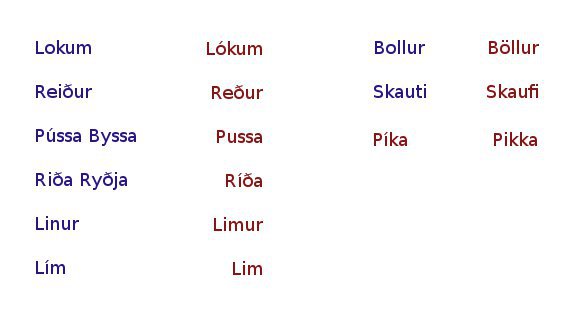Pronunciation of vowels. Posted by hulda on May 10, 2012 in Icelandic culture, Icelandic customs
Or: how to avoid saying “penis” or something equally embarrassing by accident.
While it’s ok to have an accent it’s still crucial to learn to pronounce as correctly as possible and the reason for this is that words easily change their meaning in Icelandic. Before we go on I feel like apologizing for the chosen topic because it may be a bit… juvenile. Please bear with me this time because I promise to behave better after this and because knowing these words may actually come in handy in avoiding mistakes.
 To illustrate the problem, look at the words above. Some are totally innocent – others are anything but. Try to divide them into two groups based on that. Correct answers are at the end of this post.
To illustrate the problem, look at the words above. Some are totally innocent – others are anything but. Try to divide them into two groups based on that. Correct answers are at the end of this post.
For some reason Icelandic is full of this kind of pitfalls, words that change their meaning with a simple accent mark or lack of it, one line too long, one tiny little typo, one extra sound in the pronunciation or even a mispronunciation so minor that you cannot even hear it yourself or notice that you wrote something a bit funny. Sadly the locals will hear/see it even if you don’t. Besides, as Icelanders are not used to hearing Icelandic with an accent, making too many mistakes in pronouncing words may mean trouble for getting understood*.
The grand majority of the examples I chose for this post refer to genitalia** and the male genitalia in particular although there are two for women as well (and one example that means the act of having sex). Icelanders seem to like the subject quite a lot and now I’m not only talking about those easily changeable words. Going to see an Icelandic movie is an almost certain way of seeing some full frontal male nudity***. I’d also like to mention that the world’s only penis museum, Hið íslenzka reðasafn, is located in Iceland and it has moved to Laugavegur, Reykjavík! It’s easy to find too, just walk up the street until you’re near Hlemmur and then look for a door with a large stone sculpture made in relevant shape next to it.
However, meanwhile it may be good to practise the often subtle differences in pronunciation and this means I’m going to subject you all to my slightly weird voice and accent. Hopefully I’m managing to do a passable job otherwise! These are all the official vowels of Icelandic alphabet, pronounced more carefully than anyone actually needs to because more than anything I’m striving to give an idea of the differences and similarities between certain sounds. Be especially watchful about i/y and í/ý (all four are almost identical – see that problem about lim/lím****). The differences can be difficult to learn so well that you could always automatically use the correct one, but you can at least minimize the damage by learning the most usual pitfalls and avoiding them if at all possible.
*In which case you’ll quickly learn a new, useful word: “Há?” It translates loosely to both “Excuse me my dear man but I don’t think I heard you correctly, would you mind repeating?”, “Huh?” and anything and everything in between. To be frank, in a country where every single inhabitant is related to the president and each other such casual forms of speech are probably only natural.
**Because I’m mature like that.
***Be especially mindful of any and all movies where Hilmir Snær Guðnason has a role – he tends to drop his trousers in front of the camera quite often.
****Lím means glue. Eru karlarnir með lím eða lim?
The correct answer is that everything that’s written in red means something you don’t want to say accidentally. Male parts: lókum (basic form lókur), reður, limur/lim, böllur, skaufi, pikka. Female parts: pussa, píka – in Iceland you want to be very careful with the name of a certain popular pokémon. Act: (að) ríða. Note this verb also means riding but happily it turns innocent if you always remember to add to it that you rode a horse.

Build vocabulary, practice pronunciation, and more with Transparent Language Online. Available anytime, anywhere, on any device.
About the Author: hulda
Hi, I'm Hulda, originally Finnish but now living in the suburbs of Reykjavík. I'm here to help you in any way I can if you're considering learning Icelandic. Nice to meet you!




Comments:
Mor:
Hi, thank you very much for posting. I like germanic languages and want to learn Icelandic also.
hulda:
@Mor Hi, and welcome to reading this blog! Icelandic is a truly amazing and wonderful (if occasionally a little bit challenging) language to study.